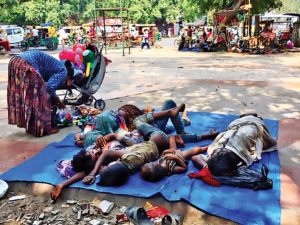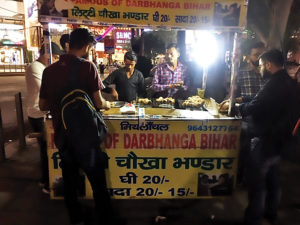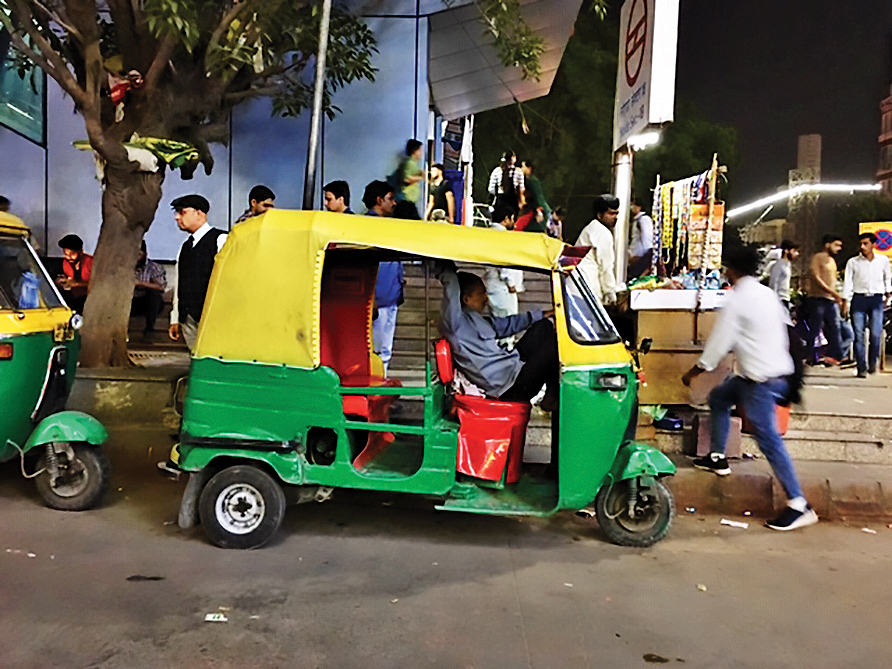The poorest of the poor who are the worst affected by the pollution are least bothered about it – some think it’s just winter fog
The irony is deep and distressing. The worst affected people by the pollution are the least bothered. They are the poorest of poor who spend most of their time out in the open: hawkers and peddlers, beggars and homeless, delivery boys, rickshaw-pullers and auto drivers, to list a few.
They have no hideout and the unfiltered polluted environment is relentlessly corroding their lungs, but they silently go about their business as if nothing has happened. Their needs so basic, poverty so overwhelming, that worrying about pollution is a proposition they cannot afford. They don’t even consider it a factor, they are grappling with far more basic existential issues.
Just outside the Lajpat Nagar Metro station, there’s a long queue of rickshaw pullers waiting to take people to places. They are mostly from Bihar, have a muscular emaciated frame, though some sport a potbelly on otherwise skinny bodies. On average, they give a ride to a person every hour.

Ram Kilavan, 27, married, already a father of three, is from Motihari district in Bihar from a family of landless labourers. He doesn’t understand the meaning of pollution — despite residing in one of the most polluted cities in the world for three years—doesn’t even understand the meaning of Hindi word for pollution, pradushan. Once he understands what is being discussed, he calls it ‘dundh’ and is fairly categorical: “It doesn’t affect us. The weather is getting cooler, it’s good for us. Heat kills us.” He is on a different trajectory.
Others rickshaw pullers join in while I explain the hazardous effects of breathing in a polluted environment. They are bemused. Ram Kilavan says and others laugh at what seems fairly ludicrous to them. “Pait mai aag lagi hai tu aakho ki chirkan pata nahin chalti (If there is fire of hunger in the stomach, itching of eyes due to pollution is not even felt). Adds Somanath, from Begusarai, the eldest of the lot, “Ask the government to give us jobs, fair price to the farmers, we will go back to the village and breathe fresh air.” Many of them live in Garhi near Kailash colony, eight in a small room and take turns to sleep.
Not far away, Rajbeer from Badaun district of Uttar Pradesh sells parathas on the pavement from 7 am to 3 pm. He’s equally dismissive of environmental concerns. “Kaam chal raha hai (it’s manageable),” he says and adds as an afterthought, “People are not coming out, is it for that reason?”
One set of workers for him pollution means better business is delivery boys. Rahul Singh, 29, a graduate, is a delivery boy with the leading pizza chain in South Delhi. He on an average rides 60 km on bike, is on the move 14 hours a day. “This is not pollution but fog, happens every year,” he is adamant. Lately, he’s been getting more orders to deliver as few people are venturing out of their houses. “Kaam kar le yaa ghar mai baith ke saihat banaye (Should I work or sit at home and take care of my health),” he asks a rhetorical question.

There are a bunch of children begging in the Red Fort-Chandini Chowk area, with their mothers and sisters. This lot of beggers is from Barmer in Rajasthan. Men are taking afternoon siestas, as sunlight manages to filter through dense smog after many days. They wear soiled Rajasthani traditional outfits, bright eyes shine on their dusty faces. Their style of begging is persuasive.
Pollution is not an issue they are willing to discuss. “Many come, talk to us, click our pictures, make money, we get nothing,” complained Shallu (name changed) She was not comfortable revealing her name, a young woman with a child. Pollution is the least of their worries. “People drive fast in the night and hit us, many get injured, my brother died last month,” she narrates without betraying any emotions. Living on the road is not safe for women and children, she explains, but not because of the pollution. She knows elections are around the corner in Delhi, hopes better blankets are distributed this time by the government.
Kuwar Singh is from Etah district in Uttar Pradesh and started working as an auto-rickshaw driver in 1990 when he was 22 years old. “Those were the days autos ran on diesel and emitted black smoke,” he says with a certain nostalgia and claims, “Pollution was much more in Delhi in those days, now it is much better,” he says a little louder to be heard by others of his profession standing in the vicinity. He has demagoguery skills of a neta, “Media is making a big hue and cry about it. Who has died? No one dies of pollution,” he asserts.
“Pollution is a political issue. It comes up before elections,” Kuwar Singh analyses. He was told his belief is not substantiated by facts. While having bati-chokha at Sector 18 Market of Noida, he expressed unhappiness with the restrictions imposed on the bursting of crackers by government on the auspicious day of Diwali.

He gives the pollution issue a communal colour. “Pollution is used as an excuse to prevent Hindus from celebrating Diwali,” he says categorically as if he knows the inside story. The situation is much grimmer than he is willing to accept. On the contrary, he lists beneficial effects of smog. “It dismisses evil spirit and kills insects and mosquitoes that cause dengue.” I’m sure his lungs don’t agree with his opinions.
Thankfully all autorickshaw drivers are not in denial like Kuwar Singh. Some of them complain of congestion, runny nose, and other respiratory problems. Somnath Thakur is from Himachal Pradesh, and speaks like the renowned comedian Kapil Sharma. “Indians have reached the moon and Mars but can’t fix the basics, clear water and clean air,” he says and quips, “Thankfully, there’s no pollution on the moon and Mars.”





